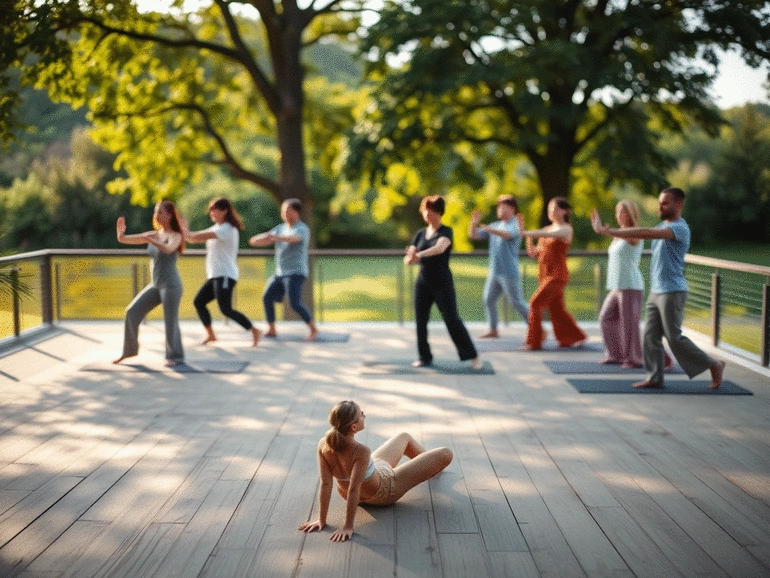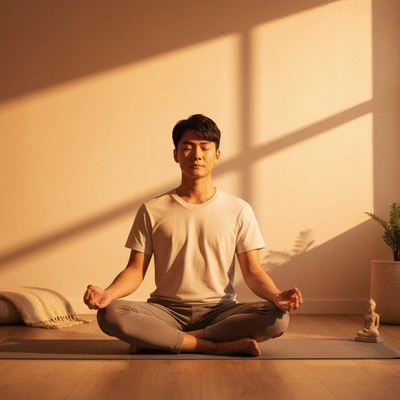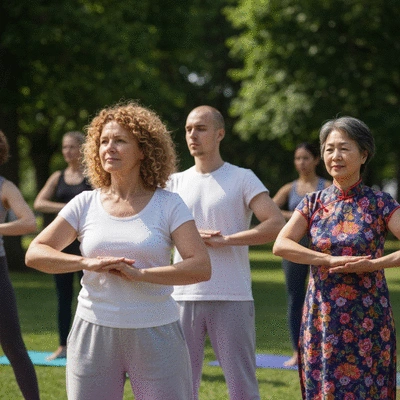
What if the key to unlocking a healthier, more balanced life lies in understanding the stress that affects us all? By recognizing how stress manifests in our bodies and minds, we can take proactive steps toward improving our well-being.
Understanding the interplay between beneficial practices like Yoga & Tai Chi and critical safety considerations is key to effective stress management.
Stress is something we all encounter, but what exactly is it? In simple terms, stress is our body’s natural response to challenging situations, whether they are emotional, physical, or psychological. When faced with a stressful event, our brain releases hormones like cortisol and adrenaline, triggering a series of physiological reactions. This response can be beneficial in short bursts—like during a crucial presentation—but when stress becomes chronic, it can lead to significant health issues.
Understanding how stress affects our bodies is key to managing it. Long-term stress has been linked to a variety of health problems, including heart disease, obesity, diabetes, and mental health disorders. As a clinical psychologist, I see firsthand how stress can manifest in different ways for each individual. Recognizing the signs and symptoms of stress is crucial in taking the first steps toward managing it effectively.

Stress affects everyone differently, but the common thread is its impact on both our mental and physical health. When stress hits, our body goes into "fight or flight" mode, preparing us to respond to danger. This can involve increased heart rate, rapid breathing, and heightened alertness. However, if this response is triggered too often, it can lead to exhaustion and burnout.
It’s fascinating how our bodies react to stress, but it’s even more important to recognize when these stressors become overwhelming. Understanding the mechanisms behind stress can empower us to develop effective coping strategies, which is a major focus at Stress Insight Solutions.
Managing stress is crucial for maintaining overall health and well-being. With the increasing demands of modern life, we need to proactively engage in stress management techniques. These can range from simple breathing exercises to more structured practices like yoga and tai chi, which I recommend often to my clients.
At Stress Insight Solutions, we emphasize that stress management is not just a one-time effort; it requires ongoing practice and commitment. By incorporating these techniques into your daily routine, you can build resilience against future stressors and lead a healthier, more balanced life.
Did you know? Incorporating mindfulness meditation into your daily routine can significantly enhance your stress management efforts. Just a few minutes of focused breathing or guided visualization can help lower cortisol levels and improve your overall emotional resilience. Start small—try setting aside just five minutes each day to practice mindfulness and observe the positive effects it has on your stress levels!
While yoga and tai chi offer remarkable benefits for stress relief, it's essential to consider who should avoid these practices. Certain individuals may face physical limitations or medical conditions that could make participation challenging or even unsafe. Let's explore these considerations further.
It's important to recognize that not everyone may be suited for yoga or tai chi. If you have any of the following conditions, you might want to consult with a healthcare provider before beginning:
These conditions can vary significantly from person to person. It's always wise to listen to your body and seek guidance from a qualified instructor or healthcare professional when starting any new physical practice.
Even for those who can practice yoga and tai chi, there are some risks to be aware of. Understanding these limitations can help you engage safely in your wellness journey. Here are some potential risks:
Being mindful of these risks allows you to set realistic goals and adapt your practice to suit your physical and emotional needs. At Stress Insight Solutions, we emphasize the importance of listening to your body and proceeding at a pace that feels comfortable for you!

Yoga and tai chi can significantly enhance your stress management strategy, but they work best when combined with other wellness practices. Let's explore how you can integrate these approaches into a comprehensive plan.
If you’re dealing with chronic stress or mental health issues, integrating yoga or tai chi with professional therapy or medication can create a powerful support system. Here are some ways to merge these practices:
Such integration fosters a holistic approach to mental well-being, allowing you to address both the physical and psychological aspects of stress.
To maximize the benefits of your stress relief journey, consider combining yoga and tai chi with other techniques. Here are some methods to enhance your practice:
By integrating diverse practices, you can create a more customized experience that resonates with your personal stress management goals.
Participating in community classes can be a game-changer for your wellness journey! Engaging with others not only provides accountability but also fosters a sense of belonging. Here are some benefits of joining community classes:
At Stress Insight Solutions, we believe that community support amplifies the positive effects of yoga and tai chi. For instance, studies have shown that community participation can significantly improve well-being. So why not explore local classes or online groups? Together, we can empower each other towards better stress management.
As you embark on this journey of stress relief through yoga and tai chi, remember that you're not alone. Many others share similar experiences, and success stories can provide inspiration and hope!
Hearing testimonials from others can be incredibly motivating. Here are some examples of how yoga and tai chi have transformed lives:
These stories remind us that the journey to stress relief is possible, and each small step counts!
Consistency is key to achieving lasting benefits from your practice. Here are some tips to help you stay committed:
By nurturing your commitment and tapping into community support, you're more likely to experience the profound effects of yoga and tai chi on your stress levels.
Finally, consider making lifestyle changes that complement your practice. Incorporating healthful habits can enhance your overall well-being:
These lifestyle changes, combined with your practice, can create a foundation for improved mental and emotional resilience. For example, a recent review highlighted the positive impact of mind-body practices on stress and inflammation. Remember, at Stress Insight Solutions, we’re here to support you every step of the way!
Here is a quick recap of the important points discussed in the article:
We illuminate the causes and effects of stress through science-informed resources, empowering you to recognize stressors and implement effective coping strategies. Your mental well-being is our priority.
